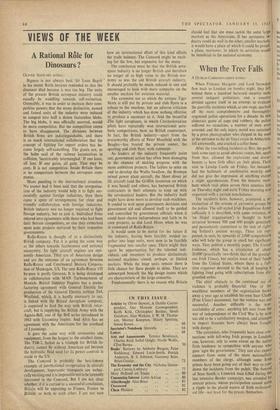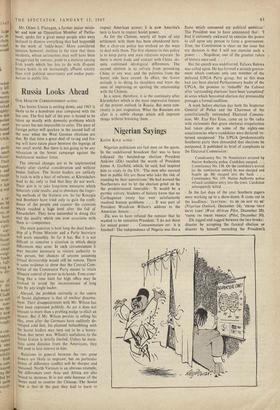When the Tree Falls
A DUHLIN CORRESPO.\DENT writes: When Princess Margaret and Lord Snowdon flew back to London on Sunda), night, they left behind them a hundred harassed security men, several indigant politicians, and a country divided against itself in an attempt to evaluate the guerrilla incidents which, at one stage, sparked off the most comprehensive and thoroughly' organised police operations for a decade. In this elaborate game of cops and robbers, the police suffered no casualties, a number of men were arrested, and the only injury noted was sustained by a press photographer who slipped in the mud at the entrance to the de Vesci estate in Abbeyleix, fell awkwardly, and cracked a collar bone.
After the tree-felling incidents at Birr, the party took some care to avoid obvious routes, but, apart from that, allowed the explosions and distur- bances to have little effect on their plans. Their visit to Leixlip Castle on Friday. 'for instance, had the hallmark of unobtrusive security and did not give the impression of anything except a slight apprehension. Even the Massive man- hunt which took place across three counties late on Thursday night and early Friday morning was organised with a certain nonchalance.
The incidents have, however, prompted a, re- evaluation of the actions of extremist groups by the police. The self-styled,IriSh Republican Army (officially it is. described, with some reticence, as an illegal orgmisation') is thought to have attracted between 500 and 600 people genuinely and passionately committed to the task of right- ing Ireland's ancient wrongs. These are sup. ported, in turn, by upwards' of 2,000 sympathisers who will help the group in small but significant ways. They publish a monthly paper, The United Irishman, which has a circulation of about 20,000 (practically two-thirds that of the prestigi- ous Irish Times), but receive most of their funds from the United States, where there is a full- time organiser devoted to the task of keeping a fighting fund going with subscriptions from dis- gruntled exiles. The chief obstacle to the continued use of violence is probably financial. One of the wealthiest members of the organisation broke away a year ago to establish his own Saor Uladh (Free Ulster) movement, but the venture was not successful. Another difficulty is the non' availability of arms: anything left over from the war of independence or the Civil War is by noW too old to be a satisfactory weapon, and attempts to import firearms have always been fraught with danger.
The extremists, who frequently have close con- nections with left-wing Irish groups in London, can, however, rely to some extent on the native Irish tendency to sympathise with anyone who goes 'agin the government.' They can also expect support from some of the more nationalistic members of the clergy, although some Irish priests have been going out of their way to con' demn the incidents from the pulpit. The funeral of Sean South, •a Limerick man killed during the last intensive Border campaign, was attended by several priests, whose participation caused quite a ripple in the placid waters of Irish ecclesiasti- cal life—not least for the priests themselves.
Mr. Oliver J. Flanagan, a former jUnior minis- ter and now an Opposition Member of Parlia- ment, spoke for a great many people who were inclined to dismiss everything that had happened as the work of 'teddy-boys.' More considered opinion, however, inclines to the view that these incidents, whose seriousness may well have been exaggerated by rumour, point to a malaise among Irish youth which has less to do with ill-spent leisure hours in an increasingly affluent society than with political uncertainty and undue pater- nalism in public life.































 Previous page
Previous page